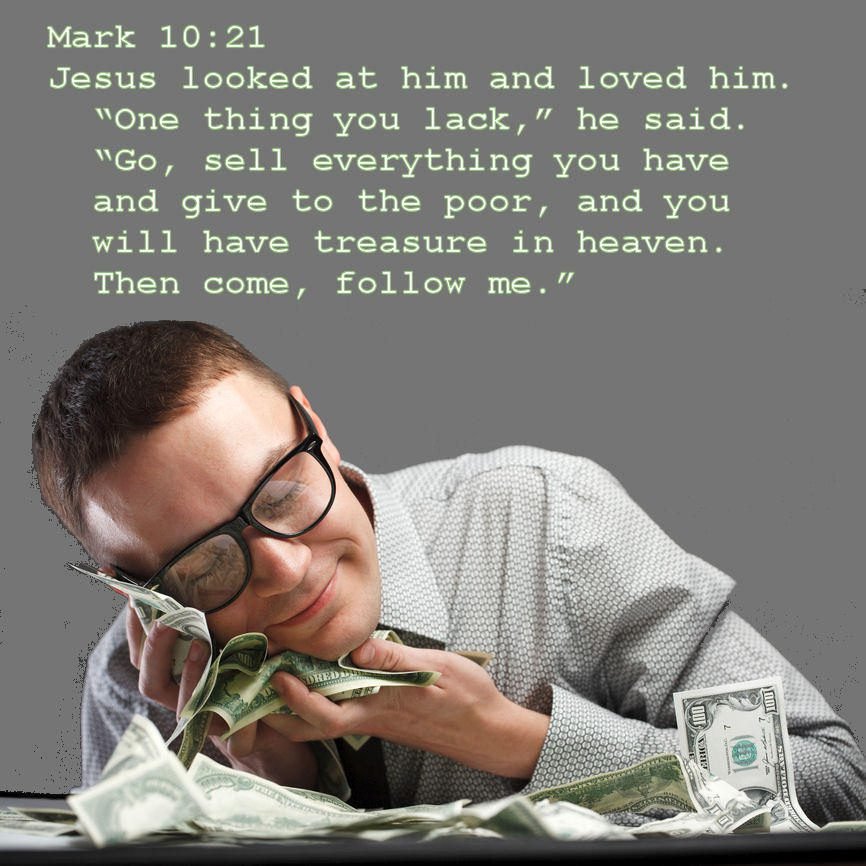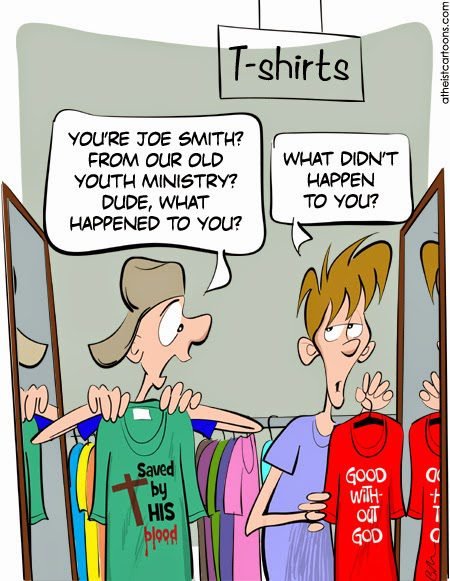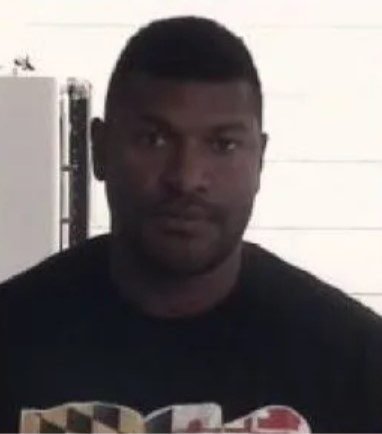
And a certain ruler asked him, saying, Good Master, what shall I do to inherit eternal life? And Jesus said unto him, Why callest thou me good? none is good, save one, that is, God. Thou knowest the commandments, Do not commit adultery, Do not kill, Do not steal, Do not bear false witness, Honour thy father and thy mother. And he said, All these have I kept from my youth up. Now when Jesus heard these things, he said unto him, Yet lackest thou one thing: sell all that thou hast, and distribute unto the poor, and thou shalt have treasure in heaven: and come, follow me. And when he heard this, he was very sorrowful: for he was very rich. And when Jesus saw that he was very sorrowful, he said, How hardly shall they that have riches enter into the kingdom of God! For it is easier for a camel to go through a needle’s eye, than for a rich man to enter into the kingdom of God. And they that heard it said, Who then can be saved? (Luke 18:18-26)
Evangelicals would have us believe that the Christian gospel is mental assent to a set of theological propositions. “BELIEVE these things, and thou shalt live,” Evangelicals say. Believe the right doctrines, pray the right prayer, and bingo! you are saved and headed for Heaven when you die. Evangelicals preach up God’s grace and our inability to save ourselves through good works, yet Jesus, the man, myth, and legend seems to say something very different in the Biblical passage above. Nowhere in Jesus’ sermons/teachings do you find him preaching the gospel preached by modern Evangelicals. It was not until the Apostle Paul that we find a greater emphasis on “right” beliefs, as opposed to “right” living. James, taking issue with the Pauline gospel, said:
What doth it profit, my brethren, though a man say he hath faith, and have not works? can faith save him? If a brother or sister be naked, and destitute of daily food, And one of you say unto them, Depart in peace, be ye warmed and filled; notwithstanding ye give them not those things which are needful to the body; what doth it profit? Even so faith, if it hath not works, is dead, being alone. Yea, a man may say, Thou hast faith, and I have works: shew me thy faith without thy works, and I will shew thee my faith by my works. Thou believest that there is one God; thou doest well: the devils also believe, and tremble. But wilt thou know, O vain man, that faith without works is dead? (James 2:14-20)
Pay close attention to how Evangelicals live and what they believe, and it’s hard not to conclude that they are following after Paul, not Jesus (or James). James was very clear: “faith without works is dead.” “Don’t tell me what you believe,” James said, “show me!” While Evangelical pastors encourage congregants to do good works, it’s evident that the message is not getting through. The average Evangelical is Christian in name only, and certainly lives in contradiction to what Jesus and James said above. Worse yet, Evangelical preachers aren’t much better. Their time is spent at the golf course, at preachers’ conferences, coddling congregants, and making fat sheep fatter. If good works are the essence of the Christian gospel, is it not true, then, that most Evangelicals are not Christian?
In Luke 18, a ruler came to Jesus and asked what he needed to do to inherit eternal life. Evangelicals believe that preparing to meet God after death is THE most important thing any of us can do. Yet, few Evangelicals take the words of Christ seriously and follow in his steps. To the ruler’s question, Jesus replied, “Thou knowest the commandments, Do not commit adultery, Do not kill, Do not steal, Do not bear false witness, Honour thy father and thy mother.” In other words, gaining eternal life was contingent on keeping the law of God. When the ruler said that he had kept the commandments from his youth forward, Jesus replied, “Yet lackest thou one thing: sell all that thou hast, and distribute unto the poor, and thou shalt have treasure in heaven: and come, follow me.” Wow, what a demand! The ruler was quite rich, and selling everything and giving it to the poor probably seemed too much of a buy-in. The Bible says, the rich man went away sorrowful for he had great possessions.
Time and again in the gospels, Jesus demanded of people who wanted to be his disciples that they sell and forsake everything and follow him. This demand wasn’t optional. Inheriting eternal life hung in the balance. It should come as no surprise, then, that Jesus had few disciples. In the book of Acts we are told that after the death of Jesus, his followers gathered in an upper room to pray. All told, there were about 120 disciples. That’s it, after three years of public ministry. I suspect one reason for this is Jesus’ works-based gospel. Jesus demanded EVERYTHING from those who would follow him.
Two thousand years later, western Christianity has become little more than a cultural religion; one that is called on in times of trouble, and when children are born, young couples marry, and old people die. Imagine if Jesus came to the churches in your community and preached his gospel. Why, churches would empty out overnight. “Sell everything and give the proceeds to the poor, Jesus? Are you nuts?” I can’t speak to Jesus’ mental state, but I do know he said this about the path to life eternal:
Therefore all things whatsoever ye would that men should do to you, do ye even so to them: for this is the law and the prophets. Enter ye in at the strait gate: for wide is the gate, and broad is the way, that leadeth to destruction, and many there be which go in thereat: Because strait is the gate, and narrow is the way, which leadeth unto life, and few there be that find it. (Matthew 7:12-14)
Jesus mentions good works, and then says the path to Heaven is a straight and narrow way, and few people find it. Billions of people claim to be Christians, yet few of them are walking the straight and narrow way. Why is that?

In the late 1980s, I came to the conclusion that good works were essential to salvation. Thinking this, of course, led me to do all sorts of things that caused personal harm and harm to my family. I took Jesus at his word when he said to sell everything and follow after him. Polly and I, along with our six children, lived in poverty for years because I really believed what Jesus said. We lived like the Beverly Hillbillies BEFORE they came to California. Imagine eight people living in a 12’x60′ wreck of a trailer, with one dinky bathroom. Our winter heat came from a Warm Morning Stove in the living room. My oldest sons have oh-so-fond memories of putting wood and coal in the stove. It would get so hot in the living room that we would open the front door and use it as a thermostat of sorts.
During our “poverty years,” I gave away money, cars, clothing, food, and sold countless personal possessions to help fund the church and help others. I so wanted to be a man who followed in Jesus’ footsteps, even to the place of crucifying my flesh for him. Of course, the problem I had with my flesh is that it kept coming back to life. Over and over again I denied self and followed Jesus and his teachings.
The years spent in poverty left a deep and lasting mark on our family. While there were many lifelong lessons learned during this time, none of us has any desire to relive the “good old days.” Were there “good” days? Sure, we were happy, at least within that paradigm. It was all we knew, so it seems normal and right to us. It was only when we escaped the Evangelical bubble that we were able to see how crazy our lives were; how foolish we were when it came to money and our family. Today, if Jesus came to me and said, “sell everything and become my disciple,” I would reply, “first, you are dead, a figment of my imagination. And second, if you really are alive, why do you need me to fund your work on earth? Get to work, Jesus! Time for you to whip out your Hogwarts wand and work some magic. You da man, right?”
I suspect I am not alone when it comes to being deeply affected by Jesus’ gospel. Long before I became an atheist, I was quite estranged from Christianity as a whole. I read passages of Scripture like the ones above, took them seriously, and did my best to implement them in my life. Why is it that most Christians didn’t do the same? Didn’t they want to be True Christians®? Why was I different from so many other Christians and pastors? That, my friend, I will leave for another day. Suffice it to say, that subject has been a frequent topic of discussion in counseling.
About Bruce Gerencser
Bruce Gerencser, 61, lives in rural Northwest Ohio with his wife of 40 years. He and his wife have six grown children and twelve grandchildren. Bruce pastored Evangelical churches for twenty-five years in Ohio, Texas, and Michigan. Bruce left the ministry in 2005, and in 2008 he left Christianity. Bruce is now a humanist and an atheist. For more information about Bruce, please read the About page.
Bruce is a local photography business owner, operating Defiance County Photo out of his home. If you live in Northwest Ohio and would like to hire Bruce, please email him.
Thank you for reading this post. Please share your thoughts in the comment section. If you are a first-time commenter, please read the commenting policy before wowing readers with your words. All first-time comments are moderated. If you would like to contact Bruce directly, please use the contact form to do so.
Donations are always appreciated. Donations on a monthly basis can be made through Patreon. One-time donations can be made through PayPal.









